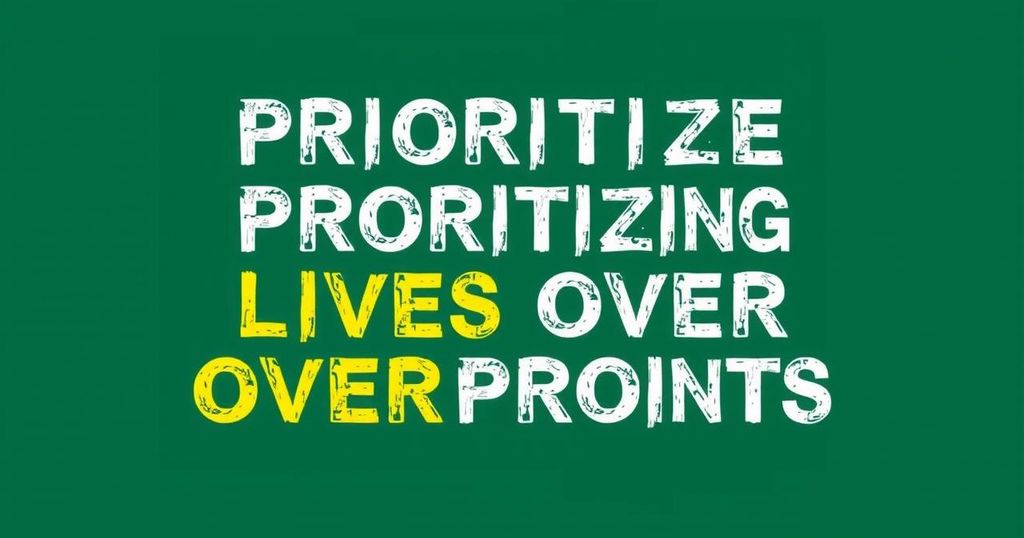COP29 in Baku addresses urgent needs for a new climate finance agreement as recent floods in Spain reveal the growing climate crisis. Developed countries must prioritize people’s welfare over profits, enabling significant financial support for vulnerable nations. The necessity for grant-based solutions instead of private sector-led initiatives is critical for effective climate response and justice.
The recent catastrophic flash floods in eastern Spain serve as a grave reminder of the escalating toll of climate change, which is increasingly affecting even developed nations. As world leaders gather in Baku, Azerbaijan, for COP29, the urgent need for a new climate finance deal is paramount. Developed economies must prioritize human welfare over financial gains, focusing on equitable climate funding that addresses the dire needs of the most vulnerable communities globally. The disparities in preparedness for climate crises between developed and developing nations underscore the need for a reassessment of financial commitments and strategies at this conference. The intended objective of COP29 is to negotiate a robust climate finance framework that will supersede the previous commitment made at the 2009 Copenhagen Summit, where developed countries pledged to mobilize $100 billion annually for climate action in developing countries by 2020. Despite achieving this target in 2022, it is evident that this funding level is grossly inadequate, necessitating the establishment of a New Collective Quantified Goal (NCQG) that reflects the trillions of dollars required to effectively combat climate change. To fulfill the needs of developing nations by 2030, comprehensive and immediate financial support is crucial. However, the current discourse during COP29 raises fundamental questions regarding the funding sources, amounts, and intended uses of the NCQG. There remains a concerning lack of consensus among nations, particularly as developed countries appear to prioritize financial contributions from the private sector over grant-based models that could provide substantive relief. This approach, which has been characterized as the “Wall Street Climate Consensus,” risks placing profits over the pressing needs associated with climate adaptation and resilience efforts. Moreover, the potential inclusion of relatively affluent emerging economies in financial contributions threatens to derail the negotiations, as many developing nations are already doing what they can under constrained conditions. The ongoing climate finance discussions must avoid repeating past mistakes that involved offering loans rather than grants, which ultimately exacerbated existing debt crises in vulnerable nations and undermined global climate justice efforts. In conclusion, it is incumbent upon developed nations to provide meaningful, grant-based climate funding that emphasizes humanity’s needs over profit margins. The international community is closely monitoring the developments in Baku, and the decisions made here will have profound implications for the prospects of sustainable climate actions. Failure to deliver adequate financial support would not only hinder immediate crisis response efforts but also impact trust in the global climate governance framework, jeopardizing future climate agreements and actions.
The background of the ongoing climate discussions is framed by recent extreme weather events, particularly the devastating flash floods in eastern Spain, which highlighted the impacts of climate change on disaster preparedness in developed nations. As leaders convene for COP29, they aim to negotiate a new climate finance framework that reflects an increased understanding of the financial requirements necessary to tackle climate challenges facing developing countries. The urgency for substantial funding adjustments has become evident in the light of previous commitments falling short and the pressing realities faced by vulnerable communities worldwide.
In summary, COP29 serves as a critical juncture for climate finance negotiations, emphasizing the necessity for developed nations to reaffirm their commitment to supporting global climate action through substantial, grant-based funding. As the consequences of climate change become more pronounced, prioritizing human welfare over profit remains the cornerstone of fostering equitable solutions. The outcome of these discussions will be pivotal for building trust and ensuring effective climate cooperation moving forward.
Original Source: www.aljazeera.com






